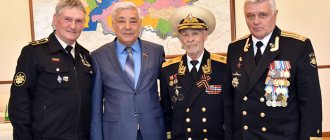Issues discussed in the material:
- What is social security for the elderly?
- What legislative acts regulate issues in the field of social protection of the elderly?
- Is social security for the elderly paid?
- How can older people get social protection? Who may be denied social protection for the elderly
The most vulnerable segments of the population are in greater need of government support than others. These include, for example, the elderly, orphans, and the poor. Russian legislation includes the Federal Law “On State Social Assistance” dated July 17, 1999 N 178-FZ. It regulates the provision of state social assistance to the above categories of citizens. In this article we will take a closer look at how social protection for the elderly is implemented.
Organization of pension provision
In Russia, every citizen has the right to receive a pension upon reaching a certain age.
What are the legislative aspects of social protection of elderly citizens in terms of pensions?
- The law states that every citizen of the Russian Federation has the right to receive a basic pension, the amount of which does not depend on his length of service and salary. It is determined by the Government of the Russian Federation and the Pension Fund. The basic part of the pension in 2019 is 5334.19 rubles. This is the minimum that all citizens of the Russian Federation who have reached retirement age can receive. The fixed base amount of the insurance part of the labor pension is regularly indexed. The Government's task is to increase the size of the basic pension to the minimum subsistence level.
- The pension also has an insurance component. The size of the insurance part of the pension is individual for all citizens; it is calculated according to a certain formula, which includes such indicators as the amount of work experience and wages, the availability of benefits (for example, bonuses are received by people who have several years of work experience in excess of the norm established by the state, veterans or WWII participants, disabled people, etc.).
- In addition, there is a third part of the pension - funded. A funded pension is a monthly lifetime payment of pension savings formed from insurance contributions from employers and income from their investment. A funded pension can be formed for citizens born in 1967 and younger if a choice was made in its favor before the end of 2015.
So, for most older people these days, their pension is formed from two parts: basic and insurance. For some citizens, the pension amount is slightly higher than the base rate. This is due to the small size of the insurance pension, which may be influenced by short work experience, low wages in the past, or the lack of documents that would confirm the presence of long experience. For example, there are often cases when people who worked their entire lives on Soviet collective farms are paid a critically small pension. And all because they could not confirm their experience with documents: due to certain economic and political circumstances that arose at the time when they worked, wages in the countryside were paid not in money, but, for example, in food rations. In addition, it could be greatly underestimated.
It is clear that the basic pension cannot provide a normal standard of living. This money does not even cover basic human needs. Such people need social protection.
Today, the state needs to work in several areas to provide elderly citizens with a normal standard of living: increase pensions, improve the pension system, and social protection of disabled people and elderly citizens in general should be based on their real needs. It is important to focus on serving the elderly at home, increase the number of boarding houses and boarding schools caring for them, and also improve the quality of their work.
We recommend
“What are social institutions for the elderly and disabled and how to get there” Read more
Features of social protection of pensioners
The implementation of pension payments is one of the main directions in the general social security system.
In general, all social security for pensioners relates specifically to pension law, therefore it is subject to universal laws and regulations. There are those specialists who attribute pension law to the community of legal institutions, and there are those who consider them a sub-branch of social security law. However, all experts note that today pension law is one of the most widespread, and has a number of features when it comes to protecting such a social category as pensioners. Today, social security and social assistance to pensioners is a priority direction, which is determined by the social policy of the state. Of course, this assistance cannot always be provided to citizens in need in full, but this area is gradually developing, and thanks to the reforms, truly significant results have been achieved in this area. Experts continue to express hope that the number of citizens whose standard of living will increase will also increase, and Russia will take its rightful place in the world classification of socially protected countries, and the poverty level will steadily fall.
Finished works on a similar topic
- Coursework Social security for pensioners 450 rub.
- Abstract Social security for pensioners 230 rub.
- Test work Social security for pensioners 240 rubles.
Get completed work or advice from a specialist on your educational project Find out the cost
The help that pensioners receive can be of different types: these are benefits, services, or cash payments. According to the law, if a pensioner refuses the cash equivalent of the cost of a set of certain benefits or services, then he has the opportunity to receive:
- Some life-saving drugs or medical supplies for which you may not be able to pay out of pocket;
- Sanatorium or resort treatment in accordance with what diseases he has and what disease is the main one;
- Free travel on commuter trains and all types of municipal transport on the territory of the Russian Federation, as well as paid trips to the place of treatment (for example, travel to a clinic or hospital).
In Russia, state support for pensioners is very developed at both the federal and regional levels. Veterans of the Great Patriotic War, combatants, widows or widowers of veterans of the Great Patriotic War are recognized as federal beneficiaries. This also includes working pensioners, and the remaining categories should be combined into one general group - regional pensioners.
Have questions about this topic? Ask a question to the teacher and get an answer in 15 minutes! Ask a Question
Note 1
Absolutely all pensioners who, for one reason or another, find themselves in a difficult life situation can receive targeted financial assistance. But, depending on the place of residence of pensioners, the amount of targeted assistance may vary significantly.
The services provided in the form of clothing and footwear, food and medicine are determined exclusively at the local level.
What pensioners are entitled to under social protection for the elderly
Due to health conditions, elderly people are often unable to go to the grocery store, buy medicine, or clean the house on their own. If such a citizen does not want to go to live in a nursing home, social security should provide him with the help of social workers. What exactly may be the responsibilities of social workers:
- assistance in everyday matters;
- cooking food;
- purchasing food and essential goods (including medicines);
- organization of leisure;
- cleaning;
- wash;
- carrying out cosmetic repairs;
- furnace firebox (if there is no central heating system);
- delivery of drinking water (if there is no running water);
- payment of utilities and other bills;
- calling a doctor;
- accompaniment to vacation spots, etc.
Social workers make purchases and pay bills from the elderly person’s personal funds.
Particular attention is paid to disabled people who cannot care for themselves. When working with this category of citizens, the responsibilities of social workers include:
- accompanying an elderly person to medical institutions;
- carrying out hygiene and other procedures;
- support in passing a medical and social examination, including in collecting and submitting the necessary documents;
- legal advice.
In municipalities there are social service centers: municipal and private. Today, care for elderly people can be transferred to specialized organizations or individual entrepreneurs; their activities are funded by the state, which means they must have a license. On the official websites of municipalities you can find a list of such organizations. According to the legislation of the Russian Federation, each region independently organizes support for elderly citizens.
All information regarding assistance to the elderly can be found:
- in social protection organizations;
- in multifunctional centers.
As part of cooperation, an agreement is concluded between an organization and a citizen. The procedure for its registration is described in Article 8.1 of Law No. 178-FZ of July 17, 1999. The contract states:
- duration of action (from three months to a year);
- list of services and their scope;
- desired result;
- rights and obligations of the parties;
- order of changes;
- grounds for termination.
An application for social assistance is submitted by the citizen who needs it. The government agency makes a decision within 10 days. If it is necessary to clarify some points (for example, the living conditions of a citizen), the period may increase to 1 month.
According to the law, an organization that provides assistance to elderly citizens within the framework of social protection has the right to independently choose its wards. However, there are categories of citizens who must be served without fail:
- women over 60 years of age;
- men over 65 years of age;
- disabled people of any age.
In addition to elderly people, social assistance is provided to orphans, the poor, wards and guardians and other categories of citizens.
We recommend
“Elderly parents: features of caring for the elderly” Read more
Legislative framework for social work with older citizens.
⇐ PreviousPage 38 of 48Next ⇒According to the Constitution of the Russian Federation (Article 7), older people are guaranteed social rights and freedoms equal to all citizens of Russia. Art. 41 older people, along with everyone else, have the right to health care and free care in state and municipal medical institutions, Art. 43 guarantees universal access and free education in state and municipal institutions. Art. 44 notes the right to participate in cultural life and use cultural institutions, to access cultural values. Article 51: the right to qualified legal assistance. Article 33 - the right to apply to state bodies and local governments.
The labor legislation of the Russian Federation does not contain any restrictions for citizens of the older generation. Although, some Russian legislative acts allow partial restrictions in connection with the age limit. For example, there is an age limit for those in public service - 60 years. Similar standards exist for military officers of the Russian Army and law enforcement officers.
According to the Law “On Employment of the Population of the Russian Federation,” citizens who, in accordance with the pension legislation of the Russian Federation, are assigned an old-age or long-service pension, cannot be unemployed, which means they are not paid unemployment benefits.
From 01/01/2002 a package of four laws adopted in development of the pension reform came into force: “On state pension provision in the Russian Federation” dated December 15, 2001. No. 166-FZ; “On labor pensions in the Russian Federation” dated December 17, 2001. No. 173-FZ; “On compulsory pension insurance in the Russian Federation” dated December 15, 2001. No. 167-FZ and “On additional monthly support for citizens of the Russian Federation for outstanding achievements and special services to the Russian Federation” dated 03/04/2002. No. 2 1-FZ. The new laws do not apply to all citizens, because... The pension program began to operate only in the second half of 2003. These changes had the least impact on the pension provision of citizens who were 50 years old at the time of the adoption of the new pension legislation. However, this category of citizens has the right to count on improved pension provision due to the indexation of pensions carried out by the Government at least once a quarter.
Federal Law "On Veterans" dated January 12, 1995 (as amended on January 2, 2000 and May 4, 2000) establishes legal guarantees for the social protection of veterans of the Russian Federation in order to create conditions that provide them with a decent life, active work, honor and respect in society. Guarantees social protection for senior citizens and provides additional rights and benefits for pensions, taxation, payment for utilities, medical care, etc.
The Federal Law “On the social protection of disabled people in the Russian Federation” (11/15/1995) is directly related to older people - disabled people.
In the “Fundamentals of the legislation of the Russian Federation on the protection of the health of citizens” (07/22/1993), art. 26 establishes the right to medical and social care at home, in institutions of the state and municipal health care systems, social services. protection of the population, the right to sanatorium treatment and rehabilitation - free of charge or on preferential terms.
Federal Law “On State Social. assistance" (07/17/1999) establishes the legal and organizational basis for the provision of state social services. assistance to low-income families or low-income single citizens.
Forms of social services to citizens, their rights, guarantees of these rights are provided for by the Federal Law “On the Fundamentals of Social. services to the population in the Russian Federation" (12/10/1995), "About social. serving elderly and disabled citizens" (02.08.1995)
Of no small importance in social work with older people is a block of general laws, which contains norms regulating education, sports and leisure activities of older citizens. These are “On Education”, “On Physical Culture and Sports in the Russian Federation”, “Fundamentals of the Legislation of the Russian Federation on Culture”, etc.
To resolve priority social problems. Other legislative and sub-legislative acts are also aimed at supporting older people, in particular: Civil, Family, Housing Codes of the Russian Federation, Laws “On Health Insurance of Citizens”, “On Public Associations”, “On Charitable Activities and Charitable Organizations”, “On the Rehabilitation of Victims” political repressions”, “On the status of military personnel”, etc.
Legislative framework for social work with youth. The legal basis of social work with youth are federal laws, regulations of a different level, supported by the Constitution of the Russian Federation.
The USSR Law “On the General Principles of State Youth Policy in the USSR” (April 1991) changed the very concept of social. work with youth. The emphasis began to be placed not on providing assistance, but on minimal starting support, stimulating the development of the abilities of young people through the social network. centers. However, this law ceased to apply with the collapse of the USSR.
In July 1993 The resolution of the Supreme Council of the Russian Federation “On the main directions of the GMP in the Russian Federation” was adopted. It defines the directions of the GMP, and also provides for the formation in young citizens of a sense of patriotism and respect for the history and culture of the Fatherland, for other peoples, and respect for human rights.
Legislative and regulatory support for GMP is carried out on the basis of the Federal Law “On State Support of Youth and Children's Associations” dated June 28, 1995. No. 98-FZ. It defines the guarantees, general principles, content and measures of state. youth support.
Federal Law “On the Basic Guarantees of the Rights of the Child in the Russian Federation” dated July 24, 1998. No. 124-FZ regulates the legal relations of the younger age group of youth, establishes the state. minimum social standards of basic indicators of the quality of life of children determines the volume of social services. services included in this standard.
Federal Law “On the fundamentals of the system for preventing neglect and juvenile delinquency” dated June 24, 1999. No. 120-FZ establishes the basis for the legal regulation of relations arising in connection with the prevention of neglect and juvenile delinquency.
In accordance with this law, the Government of the Russian Federation adopted on November 27, 2000. a resolution that approved the Model Regulations on: a social rehabilitation center for minors; social orphanage; center for helping children without parental care. It defines the procedure for the activities of these institutions, the conditions for the reception and maintenance of minors in them, staffing, management, property, and funds.
Basic legal aspects of social work with
youth are reflected in the Federal Law: “On Physical Culture and Sports in the Russian Federation”, “On Elections of State Deputies. Duma of the Federal Assembly of the Russian Federation", "On employment in the Russian Federation", "On basic guarantees of electoral rights and the right to participate in the reendum of citizens of the Russian Federation", "On benefits for travel on intercity transport for certain categories of students in state and municipal educational institutions" and etc.
In the second half of the 1990s, a lot of work was done to prepare the draft Law of the Russian Federation “On the Fundamentals of GMP in the Russian Federation”. This project defined the principles of GMP, ways of implementation, and prescribed the process of formation and implementation of GMP in the Russian Federation. The project was accepted by the State. Duma and approved by the Federation Council, but on November 25, 1998. The President of the Russian Federation rejected it. Thus, at the federal level there is currently no legislative act establishing basic norms, as well as priorities and mechanisms of government. support for various categories of youth.
Essential for organizing social activities. Institutions working with youth have regulations such as the Resolution of the Ministry of Labor on the approval of methodological recommendations for Social Centers. Help for families and children (July 1999; July 2000, No. 32,52,53,54).
The Ministry of Education of Russia sent instructions letters: “On the creation and functioning of social service institutions for youth, youth affairs bodies” (09/30/2002, No. 3), “On teenage and youth clubs of youth affairs bodies” (11/01/2002 , No. 5), etc.
Joint letter of the Ministry of Education of the Russian Federation and the Ministry of Labor of the Russian Federation “On the regulatory and legal support of social service institutions for youth under the jurisdiction of the youth affairs bodies of the constituent entities of the Russian Federation” dated 01/08/2002. No. 15-52-04 in/15-01-21, which explains the content of social media. working with young citizens.
Social activities to support young families are determined by: Decree of the Government of the Russian Federation “On additional measures to support youth in the Russian Federation” dated April 3, 1996. No. 387; Decree of the President of the Russian Federation “On the main directions of state family policy” dated May 14, 1996. No. 712; Order of the State Committee of the Russian Federation for Youth Policy “On approval of the concept of implementing state family policy for the formation and stabilization of a young family” dated March 28, 2000. No. 21; Decree of the Government of the Russian Federation “On the subprogram “Providing housing for young families”, which is part of the federal target program “Housing” for 2002-2010. dated 08/28/2002 No. 638. These documents emphasize that state policy in relation to young families is not limited to material support and assistance in fulfilling its functions, it is aimed at creating conditions for the active participation of the family in the life of Russian society.
In general, a broad legal field has been created that allows social work with youth to be effectively implemented in practice.
A number of regulatory laws are aimed at ensuring the rights to health protection, vocational guidance and vocational training and employment, recreation and health improvement for young people.
⇐ Previous38Next ⇒
Conflicts in family life. How can I change this? It is rare that a marriage and relationship exists without conflict and tension. Everyone goes through this...
System of Protected Areas in the USA The study of specially protected natural areas (SPNA) in the USA is of particular interest for many reasons...
What makes your dreams come true? One hundred percent, unshakable confidence in your...
What to do if there is no reciprocity? And now let's come down from heaven to earth. Have you landed? Let's continue the conversation...
Didn't find what you were looking for? Use Google search on the site:
Who can be denied social security for elderly citizens?
There are several categories of citizens who, by law, can be denied social protection and assistance. Firstly, these are people with mental disabilities who are prone to aggressive behavior. Secondly, these are citizens:
- having infectious diseases, including sexually transmitted diseases;
- patients with open tuberculosis;
- having alcohol or drug addiction.
Help may also be denied due to the busyness of all employees of the organization.
A person who is unable to move independently and take care of himself may be admitted to a hospital. To do this, you need the consent of the person himself and his relatives (if any) or a court decision.




